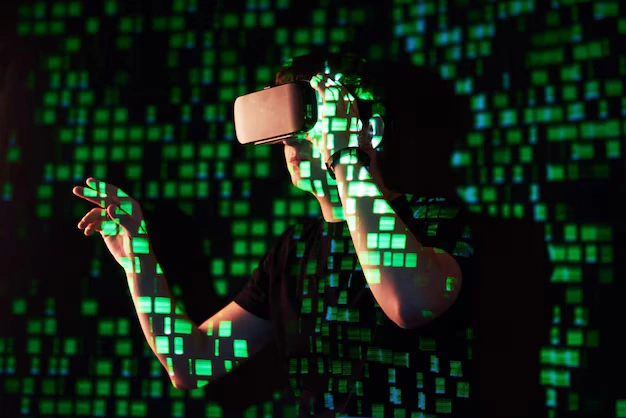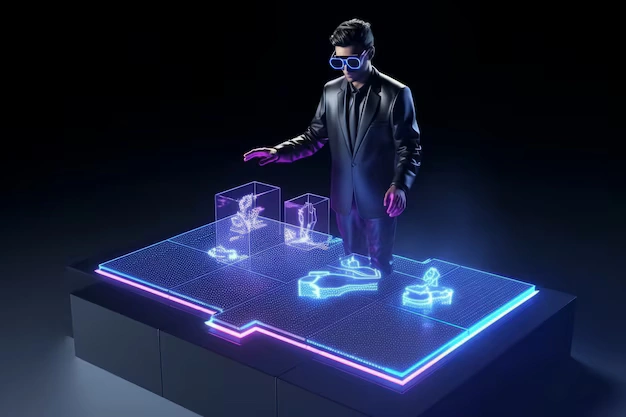Now Reading: How Blockchain Technology Is Revolutionizing the Gaming Industry
-
01
How Blockchain Technology Is Revolutionizing the Gaming Industry
How Blockchain Technology Is Revolutionizing the Gaming Industry

The gaming sector has always led the new technological front, evolving from being pixelated on a 2D screen into a virtual and, more importantly, augmented experience. Among one of the new trends that, in recent times, have disrupted the industry immensely, blockchain stands out. Unlike previous developments, which primarily dealt with visual or interactivity aspects, blockchain technology changes the basic form of the structure of games and introduces decentralization, transparency, and player sovereignty over digital assets. This technological innovation is changing how people develop and engage in games while establishing a more just economy for gamers. We consider in this paper the multiple aspects of the blockchain impact on gaming, with respect to benefits and challenges and with regard to what this could potentially become.

What Is Blockchain Technology?
The decentralized ledger blockchain is the kind that, in many computers, takes care of transactions in a safe way. Since, by its nature, it is inalterable and devoid of a central authority of power, let all participants copy its records simultaneously; thus, its data are concurrently consistent and ensures all of that work is provably traceable, tamperproof-ideal applications for game developers.
Typically, a gaming ecosystem, the developers or the publishers tend to be centralized charging for the in-game assets, the users’ data and economic transactions; therefore, via a gaming ecosystem, a gamer does not even own such an asset if one wins or acquires them within the ecosystem because it also restrains their scope of monetization and transferring that particular asset out from the ecosystem. Blockchain however develops decentralized gaming ecosystems.
Another exciting ability of blockchain development is the creation of tokens based on assets inside games as NFTs. So, the thing that makes any NFT special is that an NFT itself is an object that can be stored on a blockchain; a clear right in ownership is allocated to every NFT, so it can always be kept and used or transferred by the users even if their game servers break down so these can be sold or traded via compatible platforms. Moreover, interoperability on blockchain allows one to use the assets for other games or applications, thus enhancing their value.
Smart contracts is another blockchain technology feature in gaming, referring to self-executing agreements in which rules and obligations are pre-written and whose results are made to happen automatically once the conditions set are met. For example, using smart contracts may enable the following possibilities: game mechanics with rewards, fair play without having to trust some central authority, and examples include properly splitting prizes that fall between competitors during a tournament or conducting peer-to-peer trades with such little chance for disputes or even fraud.
With the advent of blockchain, there is going to be smooth facilitation that allows developers to make ecosystems as fair and open as possible but empowers players with their possession in the virtual world. This, in turn, made paradigms shift toward playing a more democratized and user-oriented game.
Key Ways Blockchain Is Revolutionizing Gaming
1. True Ownership of In-Game Assets
Traditionally, the assets in-game like skins, weapons, or collectibles belonged to game developers. They didn’t belong to the player; they had only a license to use the said asset inside the ecosystem of the game. Blockchain completely changes that dynamic. It has made it so that people really can own digital assets as NFTs.
- What are NFTs: NFTs are unique, one-of-a-kind digital tokens on a blockchain. They express ownership of a specific item. To the gaming fraternity, this means the ownership of the player’s items in the game and their ability to trade, sell, or transfer them outside the game.
- Example: Games like Axie Infinity and Gods Unchained allow the enabling of players to buy, sell, or trade assets in block chain-based marketplaces thereby providing real-world value.
2. P2E Models
Play to earn, also known as P2E gaming model. In this model, here, one can win cryptocurrency or NFT while playing games through a blockchain system. This game model encourages one to play with the possibility of earning money for players.
- Working: Game players shall gain tokens and other assets as set goals, battles that are won, or to score a specific level; they will be applicable to cash-out or kept in the games to withdraw real cash.
- Example: Axie Infinity game has gained popularity in the model of P2E wherein one will gain rewards in SLP tokens to trade in exchanges, cryptocurrency.
3. Decentralized Gaming Platforms
Decentralized gaming platforms where the developers and the players share power and not a central authority will be given by blockchain. This leads to a more democratic and transparent ecosystem for gaming.
Advantages:
- Equitable revenue sharing between the developers and the players.
- There will be transparency in governance through DAOs.
- Censorship and server shutdowns are reduced.
4. Increased Security and Transparency
Fraud, cheating, and a lack of transparency characterized this gaming world for years. In a blockchain system, all transactions and data from games are permanent and cannot be altered.
Main Features:
- There is no cheating because of transparent smart contracts.
- Free of counterfeits in the items of games.
- The information of the player is safely stored.
5. Cross-Game Interoperability
The most exciting potential of blockchain gaming is interoperability. Blockchain enables the ability of players to utilize their in-game assets in several games and even different platforms, creating a coherent gaming experience.

- How It Works: Assets on a blockchain can be transferred and used in other games that support the same blockchain network.
- Example: Platforms like Anjin are building blockchain-based ecosystems where assets can seamlessly move between games.
Benefits of Blockchain in Gaming
1. Player Empowerment
Blockchain takes the ownership straight back into the game to its participants in true fairness monetization with respect to its governance.
2. New sources of income.
It will lead to the realization of new incomes through NFTs, blockchain marketplace, as well as through the P2E mechanics in developers.
3. Across the world
With users accessing it, blockchain users can have some source of banking no matter how fractured that source is across the borders due to cheaper transborder crypto money transactions.
4. Transparency, trust
Transparency within the blockchain has facilitated trust among developers and the players since the games’ history together with transaction details are permanently documented in the blockchain’s ledger.
Challenges of Blockchain Gaming
Blockchain gaming has much promise, but not without challenges. Here are a few:
1. Scalability Issues
Current blockchain networks experience high transaction volumes which cause delays as well as a rise in prices.
- Solution: Layer 2 solutions and blockchains that scale better, such as Solana and Polygon, are answering these problems.
2. Environmental Concerns
There seems to be a strain on the energy used by blockchain networks, especially the networks that rely on the proof of work model of consensus.
- Solution: This problem will be eradicated if a proof of stake model is adopted and ecological blockchain systems are used.
3. Regulatory Uncertainty
The regulatory environment for blockchain and cryptocurrencies is still fuzzy and unclear for developers and players alike.
- Solution: With better liaison between the governments, developers and the industry; a gateway into clearer rules opens.
4. Adoption barriers
Most participants as well as developers don’t know much about the blockchain technology that is resulting in slow growth concerning the adoption.
- Solution: Better education together with interfaces which are quite friendly have really led to very rapid adoption and more people can very comfortably join application.

Blockchain Future In gaming
It’s still a baby in games. It promises a lot in that future. Well, now it’s ready for:
- Adoption: More and more developers and publishers with a more mainstream position are going to pop up and then ride on it, and after that, the fire will really start.
- New Game Design: Entirely new genres and mechanics beyond even the more classical gaming practices may be achieved via blockchain.
- Games to become better for players: More transparency will provide players with more interesting and fruitful gameplay.
Conclusion
Blockchain technology continued to revolutionize the gaming industry by allowing room for freedom for players, possible participation in up-and-coming economies, and an ethically clean playing field. Since a lot of difficulty is involved in embracing this technological advancement, much is likely to develop and flourish in it. It is for this reason that with gamers and developers learning more about it, on course, the future world of entertainment and means of entertainment shall be revolutionized through blockchain games.


























